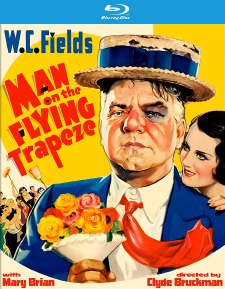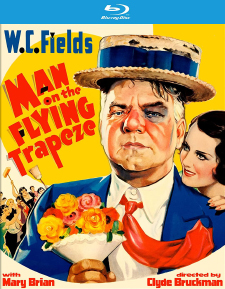Man on the Flying Trapeze (Blu-ray Review)

Director
Clyde Bruckman, W. C. Fields, Sam HardyRelease Date(s)
1935 (April 19, 2022)Studio(s)
Paramount Pictures (Kino Lorber Studio Classics)- Film/Program Grade: B
- Video Grade: B-
- Audio Grade: B
- Extras Grade: C+
Review
The 1935 W.C. Fields vehicle Man on the Flying Trapeze may sound like it’s set in a circus, but the death-defying thrills in this film are entirely of the metaphorical sort. Instead, the story features one of Fields’ trademarked henpecked husbands, who ultimately manages to triumph over circumstances despite himself. It’s a formula that served him well while he was at Paramount; he had made two films the previous year that followed the same template, You’re Telling Me! and It’s a Gift. There’s a good reason why he kept returning to it, though: it was a perfect fit for his screen persona.
Ambrose Wolfinger (Fields) is an eccentric but faithful employee of a textile manufacturer who just needs a break from life. His love of drink is a way of coping with his shrewish wife (Kathleen Howard), lazy brother-in-law (Grady Sutton), and contemptuous mother-in-law (Vera Lewis). The only person who ever stands up for him is his daughter from a previous marriage (Mary Brian). He hopes to sneak away from everything to attend a wrestling match, but when two burglars break into his basement, it launches a chain of misadventures, with the whole world seeming to conspire against him. (Watch for Fields stalwart Tammany Young and a lanky Walter Brennan as the burglars.)
The screenplay for Man on the Flying Trapeze was by Ray Harris and Sam Hardy, based on a story by Hardy and Fields, under the latter’s pseudonym Charles Bogle. Yet that may not have been Field’s only uncredited contribution to the film. Man on the Flying Trapeze was the final feature film directed by Clyde Bruckman, whose own addiction to alcohol brought his career to an early end. At least, that’s how the film is credited—supposedly, Bruckman was already of little use on the set, and Fields directed most of the film himself.
The overall tone of Man on the Flying Trapeze falls somewhere between It’s a Gift and You’re Telling Me!. Wolfinger isn’t quite the good-natured dreamer that Sam Bisbee was in You’re Telling Me!, but his scheming in this film is pretty innocuous—he just wants an afternoon off to watch a wrestling match, which seems pretty reasonable for a man who hasn’t taken a single day off in twenty-five years. Nearly everyone else in his life doesn’t see it that way, however, so he has to run a gauntlet to try to get there, and things don’t quite happen the way that he hoped.
Fortunately, everything still does work out in the end. After watching Fields be thwarted at every turn by his wife, son-in-law, employers, the police, judges, ticket takers, and fate itself, it’s nice to see him in back in the driver’s seat during the finale—literally so, in this case. Yet even he can’t make that happen on his own; instead, he gets by with a little help from a friend. For someone as perpetually henpecked as Ambrose Wolfinger, seeing him get a little support for a change makes for a thoroughly satisfying conclusion.
Cinematographer Alfred Gilks shot Man on the Flying Trapeze on 35 mm film using spherical lenses, framed at 1.37:1 for its theatrical release. Kino Lorber describes this Blu-ray version as using a “brand-new 2K master,” but there’s no indication of the elements that were used for it, though it’s likely a fine-grained master positive. It’s a little rougher than the one that was used for Your’re Telling Me!, with similar small scratches and speckling, but noticeable density fluctuations as well. The contrast runs a bit hot occasionally, with some of the whites looking blown out, and the grain in those areas having a swarming digital appearance. The grayscale is solid, though, and the overall level of detail is good. Despite any flaws, it’s still a big upgrade over the previous DVD.
Audio is offered in English 2.0 mono DTS-HD Master Audio, with optional English subtitles. Everything sounds clean and clear, with relatively little background noise to mar the experience.
The following extras are included (note that the extras here are identical to the ones that Kino featured on You’re Telling Me!, trailers included):
- Wayne and Shuster Take an Affectionate Look at W.C. Fields (SD – 51:52)
- The Old Fashioned Way Trailer (SD – 2:37)
- You Can't Cheat an Honest Man Trailer (HD – 1:37)
- The Bank Dick Trailer (SD – 1:54)
- My Little Chickadee Trailer (SD – 1:36)
- Alice in Wonderland Trailer (SD – 2:34)
Wayne and Shuster Take an Affectionate Look at W.C. Fields is a 1964 television special featuring the Canadian comedy duo Johnny Wayne and Frank Shuster. Wayne and Shuster aren’t well known outside of Canada, and they may not even be that well remembered in their home country, but they serve as tolerable (if not particularly amusing) hosts. The show is a fairly random look at Fields and his career, with some biographical information, and clips from his films. The clips are the most interesting part, because while there’s a lot of familiar material like the golf routine from You’re Telling Me, many of them are a bit more obscure, like the poker game from the Bing Crosby vehicle Mississippi. Unfortunately, Wayne and Shuster also provide editorial comments during the clips aren’t very helpful. They over-emphasize the conniving nature of the characters that Fields tended to play, while overlooking the poignancy that was also present. At least at the very end of the special, Wayne and Shuster finally acknowledge the longsuffering but ultimately winning nature of many of these characters.
Man on the Flying Trapeze doesn’t break any new ground for Fields, but it doesn’t need to try. Formulas exist for a reason, and this one worked perfectly for The Great Man. It’s always entertaining watching one of his henpecked characters triumphant in the end.
- Stephen Bjork
(You can follow Stephen on social media at these links: Twitter and Facebook.)

